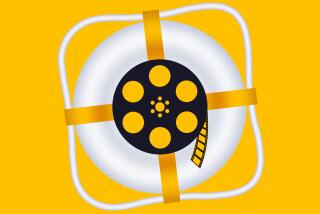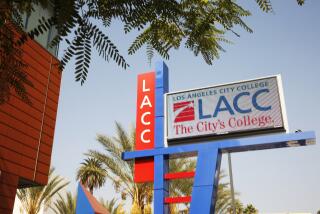Guidebook Lists Scholarships, Grants
- Share via
The Joseph Mattera National Scholarship Fund for Migrant Children of Geneseo, N.Y., provides financial assistance for college for young people in migrant families. In Athens, Ga., there is the Jeanette Rankin Foundation, which funds training or education for women over 35. The Frances C. Allen Fellowships in Chicago gives money for graduate programs to women of American Indian heritage. Phi Beta Kappa’s Mary Sibley Fellowship goes for advanced work in Greek or French studies to unmarried women between the ages of 25 and 35. The Jewish Foundation for the Education of Women gives scholarships and interest-free loans on a non-sectarian basis to undergraduate women.
These are among dozens of sources, many of them not well-known, that have millions of dollars for scholarships, grants and loans for women and minorities as compiled in a newly revised version of “Financial Aid: A Partial List of Resources for Women,” published by the Project on the Status and Education of Women of the Assn. of American Colleges.
Some are highly specific, such as the Sally Butler Fund for Latina Research in Washington or the American Women’s Medical Assn., which provides financial aid to women in medical schools. Others like the Altrusa International Foundation Awards finance training to help women qualify for employment with emphasis on vocational education. There are also numerous programs designed to finance women and minority students in fields where they have been scarce or where they are needed, such as dentistry, engineering and law.
The guide also includes detailed information on schools and study programs with an emphasis on those that may fit into the lives of women who must work and/or rear families or who are anxious about their skills because they have been out of school for some time.
The guide is available for $2.50 (checks payable to AAC/PSEW) by writing the Project on the Status and Education of Women, Assn. of American Colleges, 1818 R St., N.W., Washington, D.C. 20009.
The New York City chapter of Ladies Against Women recently gave its “Bench Your Daughter” award to President Reagan at a ceremony outside the Waldorf-Astoria.
Among other projects of the tongue-in-cheek national “ladies auxiliary”--formed by National Organization for Women members for a “unique and different perspective on women’s issues”--was a bake sale of Twinkies at the Republican Convention to help retire the deficit.
According to a report in the National NOW Times, the Bench Your Daughter Award recognized the President for “his success in increasing sex discrimination in public school athletic programs.” White-gloved, pseudonymous members, including the anti-suffragist Mrs. Agatha Merriwhether and cheerleader Cotton Candy, displayed such slogans as “Gold Rings, Not Gold Medals,” “Pump Iron, Do His Shirts” and “Brooms, Not Basketballs.”
“You may be wondering why the authors of a best seller need outside help . . . “ reads part of a fund-raising letter from the Boston Women’s Health Collective, authors of “Our Bodies, Ourselves,” the 1979 book that launched the feminist health movement. However, income has dwindled from the 6-year-old book, and while an all-new edition has just been published, the nonprofit organization will not realize profit from sales until it has paid back its publishers’ advance in mid-1986.
Thanks to its perennial best seller, the nonprofit collective has only had to raise funds twice in its 12-year history (its core members still meet once a week as they did when they formed the group) for programs that include a health information center, counseling and workshops for incarcerated women and free Spanish-language copies of their book, which are provided to clinics, farm-worker organizations and people of limited income.
A completely revised, much longer new edition of “Our Bodies, Ourselves” is due out this month. Along with updating, it is described as somewhat more radical in its view of the medical profession than the first version, addressing the doctor-female patient relationship as “one of profound inequality” and other issues such as sex bias in psychotherapy.
More to Read
Sign up for Essential California
The most important California stories and recommendations in your inbox every morning.
You may occasionally receive promotional content from the Los Angeles Times.













